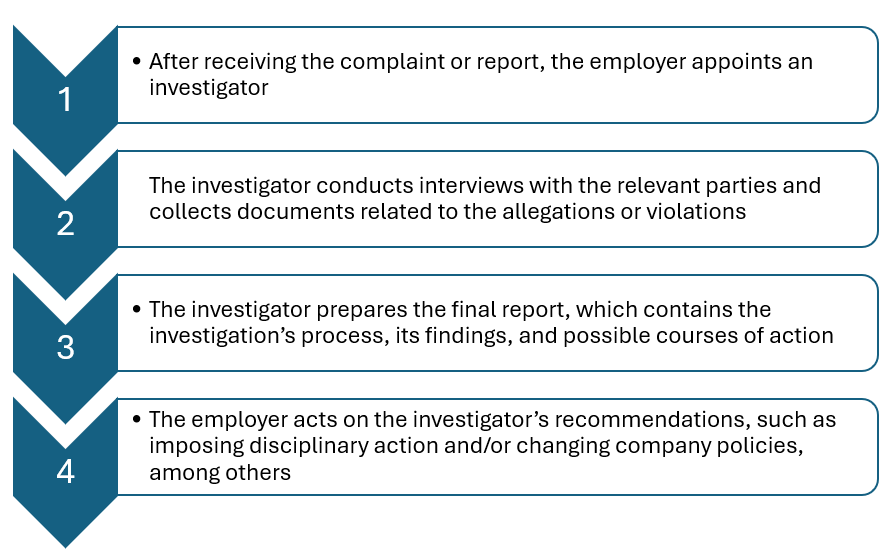
Workplace investigations are a crucial process in any work setting, so it’s important to get it right. This guide shares tips on how to choose an impartial investigator, what steps to follow, and what mistakes to avoid

Updated July 11, 2024
Whenever something happens at the workplace, the first thing that we usually say is that there is a need for an investigation into the matter. We may not know of it, but workplace investigations are required by law in certain instances. There can be serious consequences when this legal mandate is not followed.
There are certain considerations for general counsel and employers when choosing the workplace investigator. We’ll share some of these tips, and a lot more, in this article.
The use of external workplace investigators to investigate harassment and discrimination complaints is on the rise. This is because workplace investigators can deliver a process that is neutral, effective, and hopefully, legally defensible.
The job of finding, retaining, and supervising the investigator typically falls to the general counsel or director of legal services. However, as general counsel, how do you know whom to retain and what are the best ways to manage this professional relationship?
Here are the top 5 things to know about workplace investigations:
As a preliminary discussion on doing a workplace investigation, watch this video:
Looking for the best Canadian lawyers to help you with an investigation in your workplace? Check out our Special Report on the Top Labour and Employment Law Firms in Canada.
Obtain and check references before retaining an investigator. Feel free to ask to review a report that has been sanitized of all confidential and client identifying information. Ideally meet with the person you are considering before passing on the work, or at the very least, have a lengthy phone conversation. Everybody and their uncle are calling themselves workplace investigators these days and offering up their services as experts in the field.
In fact, a quick Google search will result in a lengthy list of possible candidates. Keep in mind that this is an unregulated area. Anyone can call themselves a workplace investigator, so the buyer must really beware.
In looking for someone who has depth of experience and excellent judgment, here are some questions to ask prospective investigators:
Be precise about your mandate. A good investigator will ask you at the time of the retainer what the mandate is. Here, you have a choice. The investigator can consider whether the complainant’s allegations are, as a matter of fact, true, and stop there.
The investigator can also consider whether any findings violate your policy or legislation, such as a human rights code. In most investigations, investigators are not asked to make recommendations, as that is ultimately the job of counsel.
If you do not wish there to be any recommendations, make that clear at the time the investigator is retained. Below are some downsides when an investigator’s mandate has not been clear from the start:
Give some thought to whether you wish the investigation process, report, and surrounding communication to be privileged. If you do, it is much easier to attempt to set this up at the beginning of the retainer than mid-way through. We say “attempt” because the law with respect to privilege of workplace investigation material is not settled.
There is a possibility that no matter how thoughtful you are in terms of the setup at the beginning, no privilege exists if the matter becomes litigious. You should ensure that if disclosed, all communication between you and the investigator, including the report, will not embarrass you, and will show that the process was unbiased, fair, and thorough.
Most investigations have surprises that affect how long it will take and how much it will cost. For example:
Get some sense from the investigator at the outset about how long they think the project will take. Be prepared to be flexible and reasonable.
Similarly, ask about the overall cost of the project. But again, as there are likely to be unplanned events, be flexible in this regard as well.
Insist on clear and timely communication about the process as it unfolds. Here are some questions to ask a workplace investigator:
These are all appropriate questions and do not have an impact on the investigator’s impartiality and neutrality.
Compare this with questions that should be avoided mid-process, such as:
General counsel may use this part to educate their clients on workplace investigations, what Canadian laws say about them, and matters related to investigators.
Investigators can also use this part to improve their work or in their dealings with employers before, during, and after an investigation.
A workplace investigation is a formal and legal process conducted by an employer through an investigator. It aims to:
Workplace investigations must be a fair and impartial process, conducted by a neutral third party (the investigator). In the end, the investigator’s report is the basis of all the parties affected, including the government regulatory body, on how to resolve the matter moving forward.
Workplace investigations are established, required, and imposed by Canadian laws on:
Since these three areas of law cannot be separate from each other, especially in the context of employees’ rights, these laws may overlap in some cases.
Generally, the steps during workplace investigations are:

Throughout the investigation, the parties are assured of its confidentiality. This ensures that everyone is free to express themselves and protect them during and after the investigation.
After the process ends, there is still work to be done. Find out what employers should do when the investigation is over.
Since each workplace may be governed by different federal, provincial, or territorial laws, employers are encouraged to know these laws. Here are some of the common grounds of complaints where workplace investigations should be conducted:
Whenever there’s confusion on these workplace investigations, it’s also advisable to coordinate closely with the government regulatory body.
#CHRRTV: Employment Lawyers Krista Siedlak and Emily Sheppard from Turnpenney Milne address the most common missteps employers make when investigating workplace issues and how to avoid or remedy them.
— Canadian HR Reporter (@HRReporter) May 29, 2024
Tune in: https://t.co/3OQpPaX0F7#employmentlaw #workplaceinvestigations
Find more resources on workplace investigations and everything else related to Canadian labour laws on our Labour and Employment page.
Employers are liable for the conduct of workplace investigations. Not only for finding a neutral investigator, but also for the investigation’s proper conduct. For these reasons, company lawyers are proactive in facilitating workplace investigations.
To help counsel and employers in being faithful to what the law requires, here are some common mistakes to avoid during workplace investigations:
There are instances when the workplace investigation will be tainted with bad faith, irregularities, or reasonable suspicions. These may be caused by flaws or even negligence by the employer and/or the investigator during its conduct. The consequences for employers who have been judged to conduct a flawed investigation are costly.
Here are some cases when workplace investigations can become flawed:
Of course, this is aside from the employer’s inaction or delay in investigating the complaint when it was raised by the employee. As such, employers — along with their counsel — should strive to evade these common pitfalls.
Naturally, there will be conflicts among employees because of the incident being investigated. There’s also a chance that the employer becomes hostile during the investigation. As this is one of the common mistakes made during workplace investigations, employers should know that retaliating against complaining employees is illegal.
Counsel must be very clear on this, and strongly advise clients against these. For instance, under Manitoba’s Workplace Safety and Health Regulation, it’s illegal for employers (and even the union) to carry out reprisals against employees who raise:
Aside from penalizing the employee, or retaliating against the employee through other forms, failure to pay the employee their wages or benefits is also considered a reprisal. If it’s determined that there has been reprisal against an employee, it may be ordered that:
Any tips to share on leading and organizing workplace investigations? Let us know in the comments.